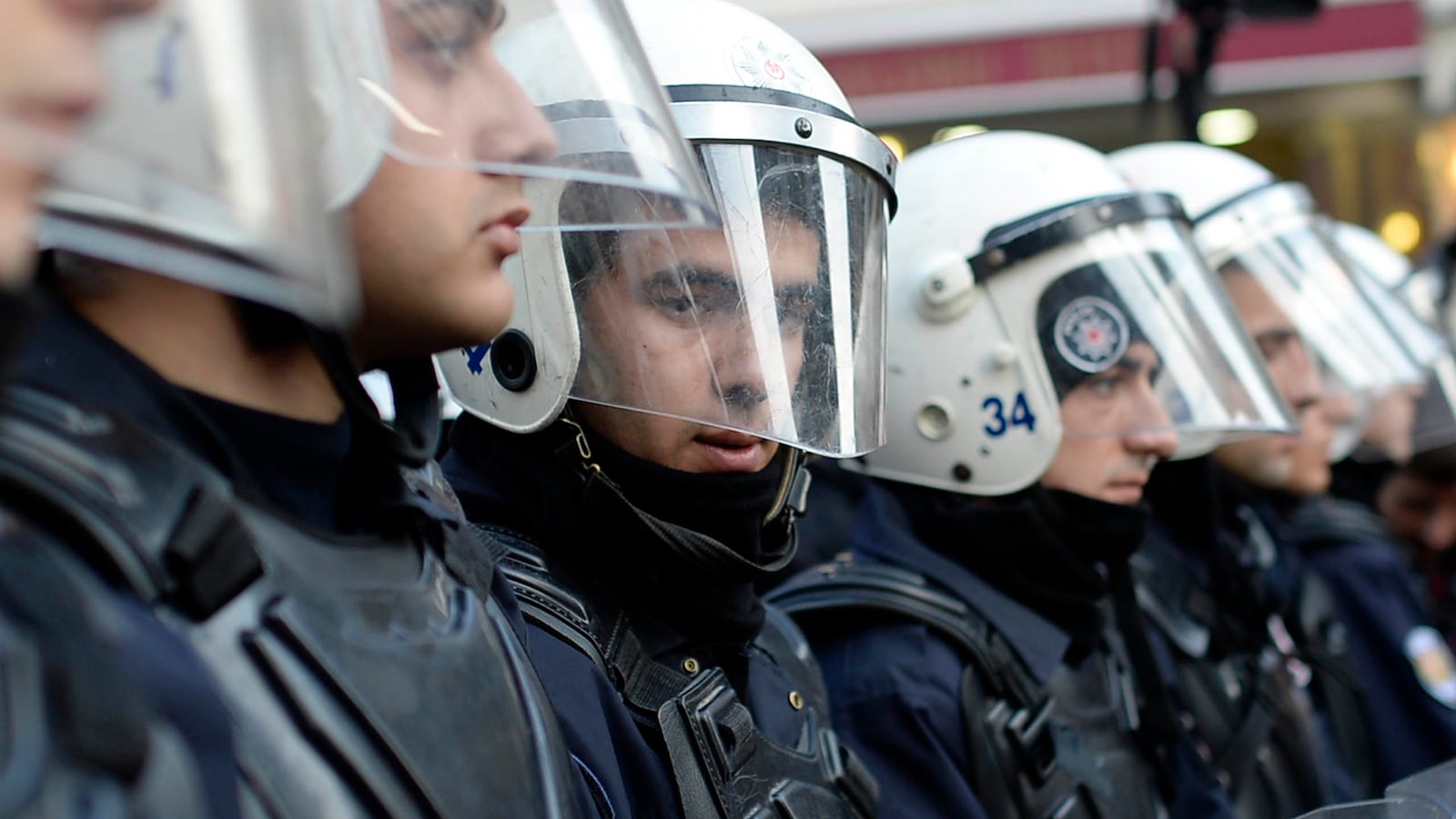ISTANBUL — Heavily armed police in eastern Turkey have clashed with members of the so-called Islamic State in a fierce gun battle that lasted several hours and killed nine people, the deadliest encounter between security forces of the NATO ally and the jihadists so far.
The shootout Monday in Diyarbakir, one of Turkey’s biggest cities, came two weeks after suspected ISIS members killed 102 people in a twin suicide attack in the capital, Ankara, it could mark a turning point in relations between Turkey and the Islamist militia.
On the campaign trail ahead of parliamentary elections this Sunday, the opposition is accusing the government of being too lenient towards—or even cooperating with—the self-styled “caliphate” of the jihadists in neighboring Syria. The government denies the accusations.
Officers on the hunt for an ISIS suicide squad, which reportedly slinked into Turkey from Syria in recent days to stage attacks, began coordinated raids at several houses in Diyarbakir in the predominantly Kurdish southeast of Turkey early on Monday. In the Huzurevleri neighborhood, the initial attack by police on a house was brought to a halt when booby traps prepared by the militants triggered explosions. Two police officers were killed and five others wounded.
In the hours that followed, armored police vehicles cordoned off streets around the area in Huzurevleri, as masked police officers with rifles drove back spectators and reporters from a street lined with trees. Shots from automatic rifles and heavy machine guns rang out and the staccato reverberations triggered car alarms. A police announcement told people in neighboring streets to “close your windows and go inside.” One woman, holding her hands to her ears, tried to run away from the terrifying noise. Television footage showed smoke rising from one of the houses under police attack.
Eight hours after the start of the initial raid, government spokesman Numan Kurtulmus said seven ISIS members had been killed and another 12 detained. It remained unclear whether the four members of the suspected ISIS suicide squad were among those killed and captured in the Diyarbakir neighborhood.
News reports said the quartet was made up of three Turkish men and a German woman of Kazakh origin, and might be planning suicide attacks or a plane hijack. The regional government of Diyarbakir said police found a large amount of weapons, ammunition and ISIS documents during the operation.
Kurtulmus said the militants in Diyarbakir had been followed since last Friday. “An important Daesh group has been neutralized,” he said, using another acronym for the jihadist group. “It was an important operation.”
Kurtulmus said authorities were now trying to work out possible links of the Diyarbakir group to other ISIS cells in the country. He said the identities and nationalities of the killed and captured ISIS members were not yet known.
The firefight in Diyarbakir was the second time that police have clashed with ISIS members on Turkish territory. In March last year, three ISIS members from Germany, Switzerland and Macedonia, who were on their way back from Syria to Europe, shot dead three people at a police checkpoint in the central Anatolian region of Nigde before they were arrested. The trial of the three men continues.
Critics say Ankara tolerated or even supported radical groups in Syria in recent years in the hope that the extremists would speed up the overthrow of Syrian President Bashar al-Assad, Turkey’s principal aim in the war next door. But a government official, speaking on condition of anonymity, emphatically denied that there was any kind of tolerance toward the jihadists.
“Daesh and other threats emanating from Syria are national security threats for us,” the official told The Daily Beast. “Turkey has lost almost 150 civilians because of Daesh,” he said, referring to the Ankara bombing and earlier attacks also blamed on ISIS.
The shoot-out in Diyarbakir is likely to fan a debate about whether authorities have failed to keep ISIS from gaining footholds in Turkey. News reports say the Ankara attack, as well as two other attacks in June and July that killed almost 40 people in total, were committed by Turkish members of an ISIS cell centered in the eastern Anatolian city of Adiyaman. Authorities are concerned that more cells might have been set up in other cities.
In a parliamentary query put to the government in August, the opposition in Ankara quoted reports saying that about 3,000 ISIS members could be in Turkey. Sinan Ogan, a former opposition lawmaker, said last year there were a number of ISIS sleeper cells in Turkey ready to strike. “It could be your local hair dresser, your shop keeper, your butcher,” he said. “When he gets the order, he can turn into a suicide bomber.”
Veysel Ayhan, an analyst at the International Middle East Peace Research Center, a think tank in Ankara, said on Twitter the Monday raid in Diyarbakir could have huge repercussions. “To understand fully if it is a breaking point in relations, we have to see if houses with [ISIS] cells in other cities receive the same treatment,” he wrote on Twitter.





